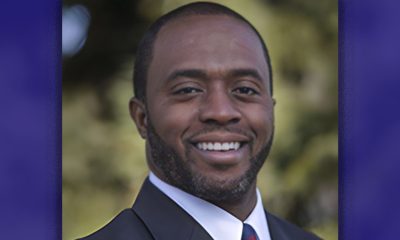Activism
Newsom’s Wife Takes On Equal Pay for Equal Work In State Jobs

For more than 25 years, Diane Shelton held steady government jobs with the state Assembly as a legislative consultant, capitol office director, legislative director and chief of staff for seven different Assembly members, starting in 1984.
When she got her first job with the Assembly, there were only seven Blacks out of 120 members of the state legislature, and just a handful of African-American staffers.
During that time, Shelton – who is African American and lives just south of Sacramento in Elk Grove – said she earned about $30,000 less than her white counterparts.
Then in 2011, Shelton, who is now 62, became a trainer with the Capitol Institute, the lower house’s professional development unit. That office operates under the supervision of the Assembly Rules committee.
In that new role, Shelton earned a salary of about $67,000. At the same time, the Assembly paid a white male counterpart almost 40 percent more money than she made: around $105,000. He had the same job title, comparable experience and performed similar duties.
Shelton says when she asked her supervisor for pay on par with her peers, he responded with only a 7.5 percent increase. After exhausting administrative options to get an annual salary equal to her white male counterpart, in 2017, Shelton decided to sue the State Assembly. She cited racial discrimination, unlawful retaliation and violation of the California Fair Pay Act, among other claims.
She is not alone.
Last week, Gov Newsom signed AB 467, also known as the “Equal Pay for Equal Play” bill, into law. The measure, introduced by Assemblymember Tasha Boerner Horvath (D-Oceanside) requires sports teams to pay women equal to men in all sporting competitions held on state land in California.
Even though California has the slimmest gender pay gap in the United States, on average, women still earn about 89 percent of the total money men are paid in the state, according to the California Commission on the Status of Women and Girls (CCSWG).
That’s about $.89 for every dollar men earn, which adds up to a loss of nearly $78.6 billion every year for women in the state.
For Black women, the pay gap is wider and has a more deep-reaching impact on African-American families across California. Black women – 80 percent of whom are the sole or primary breadwinners in their households – earn only about $.61 for every dollar a white, non-Hispanic man makes.
California has the strongest equal pay laws in the country. Yet, women with master’s degrees working full time make only $.72 for every dollar men with masters degrees earn.
“I loved my job as a trainer,” Shelton said. “I enjoyed using my skills to create original training for an increasing number of new staff. However, after seven stressful years of pursuing more equitable pay and watching decision makers devalue my work, I reluctantly retired.”
“It’s humiliating, it’s unjust and just plain wrong,” said first partner of California, Jennifer Siebel Newsom, speaking at an event on Black Women Equal Pay Day (August 22) in Sacramento. Assemblymember Shirley Weber (D-San Diego), chair of the Legislative Black Caucus, other lawmakers and guests joined the governor’s life partner to bring attention to the issue.
In April, Siebel Newsom announced that her office was partnering with the CCSWG, California Labor Agency Secretary Julie Su and TIME’S UP, an organization focused on fair, safe and dignified work for women. Together, the coalition launched a statewide initiative called #EqualPayCA.
“We all win when women win,” Siebel Newsom said. “Women are the backbone of our families.”
In 2015, former Gov. Jerry Brown signed into law the California Fair Pay Act. Sen. Hannah-Beth Jackson (D-Santa Barbara) sponsored the bill she wrote to give teeth to the state’s existing labor law, the California Equal Pay Act, which was passed in 1949, first affording equal pay to women in the workplace.
Besides requiring equal pay for men and women in “substantially similar jobs,” the new amendment included race and ethnicity, too; outlawed retaliation against employees who complain about unfair pay; and allowed for equal pay salary claims for the same kind of job – even when located in different places.
Since then, California’s equal pay law has inspired similar legislation in 41other states and Jackson is putting forth a new bill that will require organizations with 100 employees or more to make annual salary reports to the state broken down by gender, race and ethnicity.
In California, where there remains a gaping wealth disparity between Blacks and other racial groups, any equal pay effort that takes into account gender and race takes on much greater significance. In 2014, in Los Angeles and Orange counties, the median household net worth of U.S.-born whites was $355,000 compared to just $4,000 for U.S.-born Blacks, according to the California Budget and Policy Center.
Since launching her equal pay campaign, Seibel Newsom says 27 California companies have taken the equal pay pledge, including Gap, Intel and Cisco. And even though the state has a strong equal pay law on the books, more work needs to be done.
“It’s about education, implementation and enforcement,” she says. “I applaud these businesses for stepping up and doing their part to ensure pay equity within their companies, and I encourage all other businesses in California to follow suit. Together, we can close the pay gap and create a more equitable California for all.”
Activism
Oakland Post: Week of April 24 – 30, 2024
The printed Weekly Edition of the Oakland Post: Week of April 24 – 30, 2024

To enlarge your view of this issue, use the slider, magnifying glass icon or full page icon in the lower right corner of the browser window. ![]()
Activism
Oakland Post: Week of April 17 – 23, 2024
The printed Weekly Edition of the Oakland Post: Week of April 17 – 23, 2024

To enlarge your view of this issue, use the slider, magnifying glass icon or full page icon in the lower right corner of the browser window. ![]()
Activism
Oakland Schools Honor Fred Korematsu Day of Civil Liberties
Every Jan. 30, OUSD commemorates the legacy of Fred Korematsu, an Oakland native, a Castlemont High School graduate, and a national symbol of resistance, resilience, and justice. His defiant stand against racial injustice and his unwavering commitment to civil rights continue to inspire the local community and the nation. Tuesday was “Fred Korematsu Day of Civil Liberties and the Constitution” in the state of California and a growing number of states across the country.

By Post Staff
Every Jan. 30, OUSD commemorates the legacy of Fred Korematsu, an Oakland native, a Castlemont High School graduate, and a national symbol of resistance, resilience, and justice.
His defiant stand against racial injustice and his unwavering commitment to civil rights continue to inspire the local community and the nation. Tuesday was “Fred Korematsu Day of Civil Liberties and the Constitution” in the state of California and a growing number of states across the country.
One OUSD school is named in his honor: Fred T. Korematsu Discovery Academy (KDA) elementary in East Oakland.
Several years ago, founding KDA Principal Charles Wilson, in a video interview with anti-hate organization “Not In Our Town,” said, “We chose the name Fred Korematsu because we really felt like the attributes that he showed in his work are things that the children need to learn … that common people can stand up and make differences in a large number of people’s lives.”
Fred Korematsu was born in Oakland on Jan. 30, 1919. His parents ran a floral nursery business, and his upbringing in Oakland shaped his worldview. His belief in the importance of standing up for your rights and the rights of others, regardless of race or background, was the foundation for his activism against racial prejudice and for the rights of Japanese Americans during World War II.
At the start of the war, Korematsu was turned away from enlisting in the National Guard and the Coast Guard because of his race. He trained as a welder, working at the docks in Oakland, but was fired after the bombing of Pearl Harbor in 1941. Fear and prejudice led to federal Executive Order 9066, which forced more than 120,000 Japanese Americans out of their homes and neighborhoods and into remote internment camps.
The 23-year-old Korematsu resisted the order. He underwent cosmetic surgery and assumed a false identity, choosing freedom over unjust imprisonment. His later arrest and conviction sparked a legal battle that would challenge the foundation of civil liberties in America.
Korematsu’s fight culminated in the Supreme Court’s initial ruling against him in 1944. He spent years in a Utah internment camp with his family, followed by time living in Salt Lake City where he was dogged by racism.
In 1976, President Gerald Ford overturned Executive Order 9066. Seven years later, the 9th Circuit Court of Appeals in San Francisco vacated Korematsu’s conviction. He said in court, “I would like to see the government admit that they were wrong and do something about it so this will never happen again to any American citizen of any race, creed, or color.”
Korematsu’s dedication and determination established him as a national icon of civil rights and social justice. He advocated for justice with Rosa Parks. In 1998, President Bill Clinton gave him the Presidential Medal of Freedom saying, “In the long history of our country’s constant search for justice, some names of ordinary citizens stand for millions of souls … To that distinguished list, today we add the name of Fred Korematsu.”
After Sept. 11, 2001, Korematsu spoke out against hatred and discrimination, saying what happened to Japanese Americans should not happen to people of Middle Eastern descent.
Korematsu’s roots in Oakland and his education in OUSD are a source of great pride for the city, according to the school district. His most famous quote, which is on the Korematsu elementary school mural, is as relevant now as ever, “If you have the feeling that something is wrong, don’t be afraid to speak up.”
-

 Activism4 weeks ago
Activism4 weeks agoOakland Post: Week of March 27 – April 2, 2024
-

 #NNPA BlackPress4 weeks ago
#NNPA BlackPress4 weeks agoBeloved Actor and Activist Louis Cameron Gossett Jr. Dies at 87
-

 Community1 week ago
Community1 week agoFinancial Assistance Bill for Descendants of Enslaved Persons to Help Them Purchase, Own, or Maintain a Home
-

 Activism3 weeks ago
Activism3 weeks agoOakland Post: Week of April 3 – 6, 2024
-

 Business1 week ago
Business1 week agoV.P. Kamala Harris: Americans With Criminal Records Will Soon Be Eligible for SBA Loans
-

 Activism2 weeks ago
Activism2 weeks agoOakland Post: Week of April 10 – 16, 2024
-

 Community1 week ago
Community1 week agoAG Bonta Says Oakland School Leaders Should Comply with State Laws to Avoid ‘Disparate Harm’ When Closing or Merging Schools
-

 Community6 days ago
Community6 days agoOakland WNBA Player to be Inducted Into Hall of Fame

























































